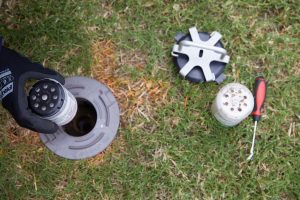
Termite Control - Bait versus Liquid Treatments - McDonough, Ga area
- Garey Clark

- Aug 16, 2025
- 3 min read
Liquid vs. Bait Termite Control: Choosing the Right Solution for Your McDonough Home
Termites pose a major risk to homes throughout Georgia, including McDonough, due to the prevalent humid climate and abundance of wood-frame structures. If you’re considering termite treatment, two of the most common professional methods are liquid termiticide barriers and bait station systems. Here’s a breakdown of each, their pros and cons, and local insights about Clark Pest Remedy in McDonough. Every scenario is different. A thorough inspection is needed in order to provide the best remedy. Also the type of construction is critical.
Liquid Termite Treatments
How it Works
• A trench is dug around your home’s perimeter, and a liquid termiticide is applied to the soil.
• The solution creates a chemical barrier; termites passing through the soil are killed, often before they reach your house.
Pros
• Fast results: You see near-immediate termite population reduction compared to bait stations.
• Long-lasting: Treatments typically protect for several years (often up to 5 years in Georgia).
• Cost-effective over time: Higher upfront cost, but annual renewal is generally less than bait station monitoring.
• Colony impact: Some modern formulas allow termites to carry the compound back, affecting the entire colony.
Cons
• Trenching required: Landscapes may need to be disturbed for installation.
• Possible drilling: Concrete patios or garages might require holes for full soil coverage.
• Barrier maintenance: Weather and soil shifts can create gaps, potentially weakening long-term protection. Also most may not realize but an average 200 lineal foot home would require approx 200 gallons be used per label.
Termite Bait Systems
How it Works
• Plastic bait stations are placed in the ground around your home, containing cellulose (a termite bait with a growth regulator).
• Termites enter and feed, later carrying a slow-acting poison back to the colony for population control.
Pros
• Minimal landscape disruption: Installation is less invasive than liquid barriers.
• Colony destruction: Bait is specifically designed to be carried back to kill the colony, not just workers.
• Good for sensitive areas: Often used near wells or bodies of water where liquids may not be recommended.
Cons
• Slower results: It can take weeks or months to fully impact the colony.
• Ongoing cost: Requires quarterly monitoring and bait replacement, with annual costs often exceeding liquid renewal fees after the first few years.
• Maintenance: Frequent inspections are essential for effective protection.
Combination
Clark Pest Remedy offers combination treatments that use both liquid barriers and bait stations for maximum coverage and detection. This may increase upfront and ongoing costs but can enhance peace of mind if your home is at high risk.
Clark Pest Remedy in McDonough, GA
Clark Pest Remedy offers termite control services in McDonough and the surrounding metro Atlanta area, employing both liquid and bait strategies depending on your property and risk level. Their customized plans account for home design, soil conditions, and your preferences. For local expertise, consider scheduling an inspection and discussing which approach—or a combination—best fits your home’s needs.
Quick Comparison
Final Thoughts
• Liquid treatments deliver rapid results and long-term protection, ideal for immediate concerns.
• Bait stations offer less intrusive installation and are best for preventing colony establishment, especially where liquid may not be safe.
• In McDonough, Jackson, Barnesville, Locust Grove, Georgia, Clark Pest Remedy is equipped to recommend the best solution for your home, factoring in local conditions and your budget.
.png)














Comments